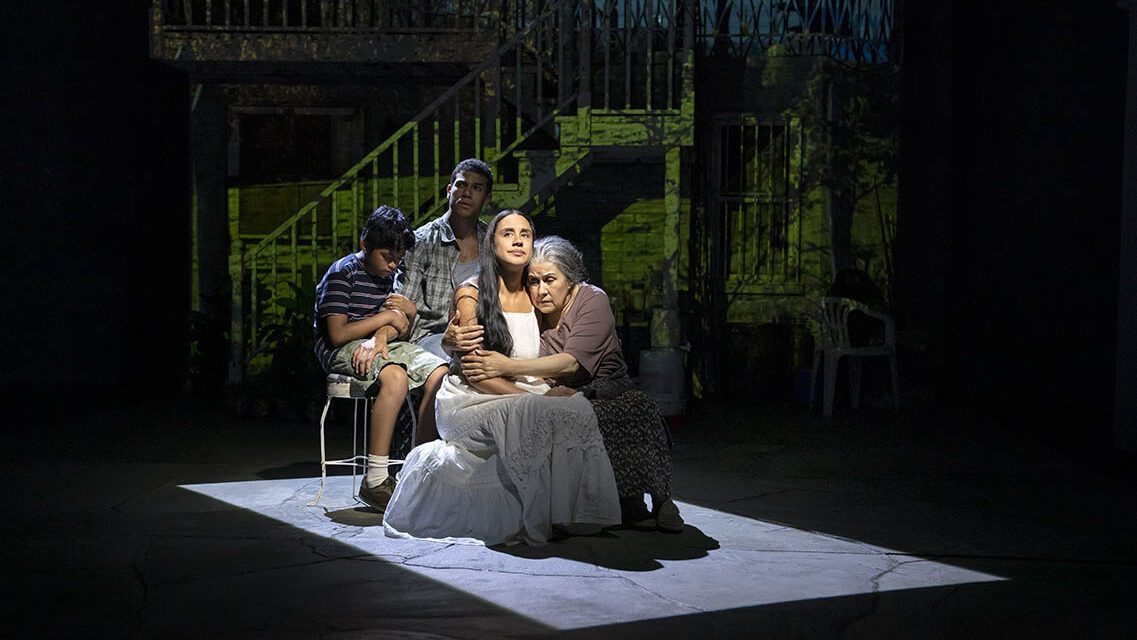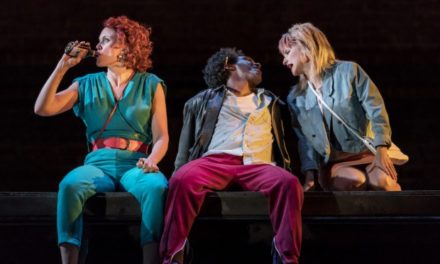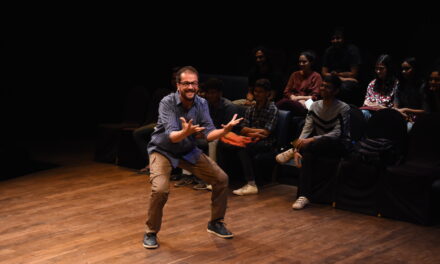For many who live in the US border states, the peril of crossing the US-Mexico border is a tale as old as time. It wasn’t new when Donald Trump called Mexicans “bad hombres” and “rapists”, nor was it new when Barack Obama swore his oath of office and George W. Bush before him. The narrative arc of migrants hiding in truck beds, rapes and murders by police or border guards, coyotes who cheat migrants, and long deadly desert crossings are as well-trod as the dirt beneath the migrant’s feet. It is told so often that it has almost become a narrative template akin to Joseph Campbell’s “Hero’s Journey”—this despite the journey’s ever-present horrific reality. When retold and staged, this persistent narrative causes me to ask: Who is this for? Who has not yet heard this story in the United States? This story cannot be for some Mexican, South American, or other Latinx audiences who have an intimate experience with the reality of this journey, for then they are being asked to revel in the pain of their people once again. Or is it exclusively for the white gaze, to empathize with migrants through their suffering? Playwright Luis Alfaro’s new play Mojada—directed by Chay Yew at New York City’s Public Theater—ingeniously weaves his story through the Greek tragedy of Medea and journeys form the Mexican border into the United States. But Alfaro does something interesting: he traverses the border, telling that narrative to those who may or may not have heard it, but does it while also directly challenging Latinx people to examine their own place within the fabric of the US. It is a theatrical code-switching that is both surprising and powerful in its execution.
Mojada marks the newest addition to Alfaro’s Chicano adaptations of Greek tragedies, coming on the heels of the lauded Oedipus El Rey in 2017, which also played at the Public Theater and was directed by Chay Yew. Alfaro, an accomplished performance artist, playwright, and social activist, has garnered new acclaim for these Greek-Chicano adaptations nationwide. This current adaptation places Medea (sensitively played by Sabina Zúñiga Varela) in Queens, NY with her spouse Jason (Alex Hernandez), their son Acan (Benjamin Luis McCracken), and caretaker Tita (Socorro Santiago). Medea is a quiet, hard-working woman who carries the burden of intense trauma from an appalling experience crossing the Mexican-US border with her family; trauma that causes her to cloister herself within the concrete block of the small Queen’s home, sewing clothes for pennies in near silence. Medea grounds herself in this new, cold environment with her Nahuatl rituals, her family, and a budding friendship with her gregarious Puerto Rican neighbor Luisa (hilariously played by Vanessa Aspillaga). But a chasm is growing within her family that further alienates Medea: Jason is spending too many hours away from the family, supposedly working his way up in his new job, and is attempting to Americanize the home—at one point encouraging their son Acan to stop playing soccer and start playing basketball like American kids. The weight of her trauma, the steady betrayal of her husband, and further displacement drive Medea towards a brink that is both terrifying and heart-wrenching.
Rather than give a beat-by-beat synopsis of the work, one could easily fall back on their high school or college reading of Euripides’ short play Medea, as Luis Alfaro cleanly overlays his Mojada over Medea—with a variety of clever reinterpretations on Alfaro’s part. It is this familiarity with the original work that may induce a specific response from some audiences: distance. One could assume that this distance may be even more acute for some white audiences, as they could approach the work with an anthropological white gaze; tracking the classic narrative’s beats as it is transposed on a Mexican migrant narrative. There is a distance for some Mexican and other Latinx audiences as well, in the familiar, almost rote horror narrative of border-crossings. Early on, I found myself wondering if or when someone would die in the desert on their journey towards the US or a Mexican police officer would rape a migrant. I’ll admit that it is crass and awful to think this way about these very real stories, but my anticipation was not without merit: these things occur too often on the journey and the moments were also matched beat-by-beat in the production.

Medea (Sabina Zúñiga Varela), Acan (Benjamin Luis McCracken), and Tita (Socorro Santiago) in Mojada. Photo credit: Joan Marcus
The power of this production, however, is not because it soars on the back of a Greek Classic or even because of the timeliness of the immigrant narrative (timely as it always has been). It is in the literal physical absence but the constant existential presence of American whiteness in every word of the piece. Luis Alfaro and director Yew expertly populate the stage with Latinx bodies; enriching each character with unique backstories, while casting their circumstance at the feet of the White American myth of success and privilege. The best example of this is Ada Maris’ fierce portrayal of Pilar, Jason’s boss. Think of her as a character that combines Glauce, the daughter of King Creon, and Creon himself from Euripides’ play. Pilar is a Cuban immigrant who has made a fortune for herself through marriage and hard work. She not only owns Jason and Medea’s home (and many other buildings on their block), she is Jason’s boss and lover. Alfaro gives Pilar some of the most damningly honest dialogue about being an immigrant woman who pulled herself up from her bootstraps and…well, even that narrative is familiar. But that narrative is the most complex to disentangle and distance oneself from for white and Latinx audiences because it undergirds almost everything in the US mythos.
It is in this representation of the ever-present bootstrap myth that the play constructs a vocabulary that is specific for white audiences and Latinx audiences separately—a dramaturgical code-switching if you will. For white audiences, it presents the trap of American success bought and sold by privilege. It spotlights the paths of privilege that are paved by whiteness and the barriers—literal and figurative—to success in America for so many others. It hopefully asks white audiences to look at their complicity in constructing and maintaining the trap of self-made “success.” For Latinx audiences, it is a condemnation of adopting of the bootstraps myth, seemingly saying that it becomes all too easy to use those same boots to step on the necks of others who are just like yourself. Alfaro paints Pilar as a Cuban in White clothes; a Latinx woman adopting the gait, the accent, and the vocabulary of the same people that want to build a wall against other “Hispanics” just like her. Towards the end of Mojada, Pilar begins the process of physically deporting Medea back to Mexico, becoming a tool of the oppressor herself. This narrative of Latinx people embracing the hubris of whiteness/privilege is not a common narrative and I welcomed the necessity of this message for us.
In its simplest terms, though, the message of the play is in the name. Mojada is a vulgarity meaning “wetback,” which is usually aimed at Mexicans in the West and Southwest United States. It is a term I am all too familiar with, coming from New Mexico. But my own familiarity with the term isn’t because it has been an invective hurled at me. It’s because I’ve heard people in my own family use it against other Latinx people in disregard and denigration. The phrase in and of itself is the bridge that crosses the code switched language, for it is a word that places the speaker, white, Latinx, or otherwise in the seat of privilege, looking down on those who don’t yet even have boots to pull themselves up with.
This post was written by the author in their personal capacity.The opinions expressed in this article are the author’s own and do not reflect the view of The Theatre Times, their staff or collaborators.
This post was written by James Montaño.
The views expressed here belong to the author and do not necessarily reflect our views and opinions.


















